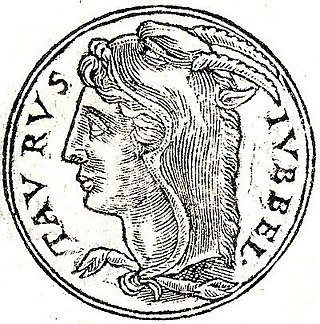Related Research Articles

Lucius Aemilius Paullus Macedonicus was a two-time consul of the Roman Republic and general, who conquered Macedon in the Third Macedonian War.

The gens Fabia was one of the most ancient patrician families at ancient Rome. The gens played a prominent part in history soon after the establishment of the Republic, and three brothers were invested with seven successive consulships, from 485 to 479 BC, thereby cementing the high repute of the family. Overall, the Fabii received 45 consulships during the Republic. The house derived its greatest lustre from the patriotic courage and tragic fate of the 306 Fabii in the Battle of the Cremera, 477 BC. But the Fabii were not distinguished as warriors alone; several members of the gens were also important in the history of Roman literature and the arts.
Decimus Junius Silanus Torquatus was a Roman senator who lived during the 1st century.
Sextus Appuleius is the name of four figures during the 1st century BC and 1st century AD. The first Sextus Appuleius was married to Octavia Major, the elder half-sister of Augustus. The three subsequent figures named Sextus Appuleius are respectively the son, grandson and great-grandson of Sextus Appuleius (I) and Octavia Major.
Lucius Aemilius Paullus was the son of Paullus Aemilius Lepidus and Cornelia, the elder daughter of Scribonia. He was married to Julia the Younger, the eldest granddaughter of the Emperor Augustus.
Octavia the Elder was the daughter of the Roman governor and senator Gaius Octavius by his first wife, Ancharia. She was the elder half-sister to Octavia the Younger and Roman Emperor Augustus.
Gnaeus Cornelius Lentulus Marcellinus was a Roman statesman and consul of 56 BC. He was married at least twice. His first wife is unknown but his second wife was probably Scribonia, at least twenty years his junior, who later became the second wife of Augustus.
Quintus Fabius Maximus was a general and politician of the late Roman Republic who became suffect consul in 45 BC.
Quintus Fabius Maximus Aemilianus was a Roman statesman and consul.
Quintus Aelius Tubero was a Roman senator. He was one of the priestly quindecimviri sacris faciundis who oversaw the celebration of the Saecular Games in 17 BC. He held the office of consul in 11 BC with Paullus Fabius Maximus. Rüpke and Glock date his appointment to the college of priests about 21 BC.
Quintus Junius Blaesus was a Roman politician who lived during the reigns of Augustus and Tiberius. He was the maternal uncle of Lucius Aelius Sejanus, the Praetorian Prefect of Emperor Tiberius.

Titus Statilius Taurus was the name of a line of Roman senators. The first known and most important of these was a Roman general and two-time consul prominent during the Triumviral and Augustan periods. The other men who bore this name were his descendants.
Fabia Numantina was a member of the patrician Fabia gens. Precisely how she fits into this family is not certain; while she is generally believed to be the daughter of Paullus Fabius Maximus and Marcia, a maternal first cousin of Augustus, it is possible that she was the daughter of Paullus' brother, Africanus Fabius Maximus.

Paullus Fabius Maximus was a Roman senator, active toward the end of the first century BC. He was consul in 11 BC as the colleague of Quintus Aelius Tubero, and a confidant of emperor Augustus.
Marcus Livius Drusus Libo was an ancient Roman consul of the early Roman Empire. He was the son of Lucius Scribonius Libo and adopted brother of the empress Livia. His natural paternal aunt was Scribonia, the second wife of Augustus, as a consequence of which he was a maternal first cousin of Julia the Elder.
Paullus Fabius Persicus was the only son of Paullus Fabius Maximus and Marcia, a maternal cousin of Augustus and great-niece of Julius Caesar. As such, Persicus was a first-cousin-once-removed of Augustus and a great-great-nephew of Julius Caesar.
Claudia Marcella Minor (PIR2 C 1103, born some time before 39 BC) was a niece of the first Roman emperor Augustus. She was the second surviving daughter of the emperor's sister Octavia the Younger and her first husband Gaius Claudius Marcellus. Marcella had many children by several husbands, and through her son Marcus Valerius Messalla Barbatus she became the grandmother of the empress Messalina.

Lucius Marcius Philippus was a Roman politician who was elected suffect consul in 38 BC. He was step-brother to the future emperor Augustus, as well as his uncle
Gaius Junius Silanus was a Roman Senator active during the reigns of Augustus and Tiberius. He acceded to the rank of Roman consul in 10 AD as the colleague of Publius Cornelius Dolabella. For the term 20/21 the sortition selected him to be proconsul of Asia. However, upon his return to Rome in 22 he was accused of malversation (misconduct). To this alleged crime his accusers in the senate added the charges of treason (majestas) and sacrilege to the divinity of Augustus.
Paullus Aemilius Regillus or Regulus was a Roman Senator and grandnephew of the emperor Augustus.
References
- Ronald Syme, The Augustan Aristocracy (Oxford University Press, 1989). ISBN 0-19-814731-7, ISBN 978-0-19-814731-2